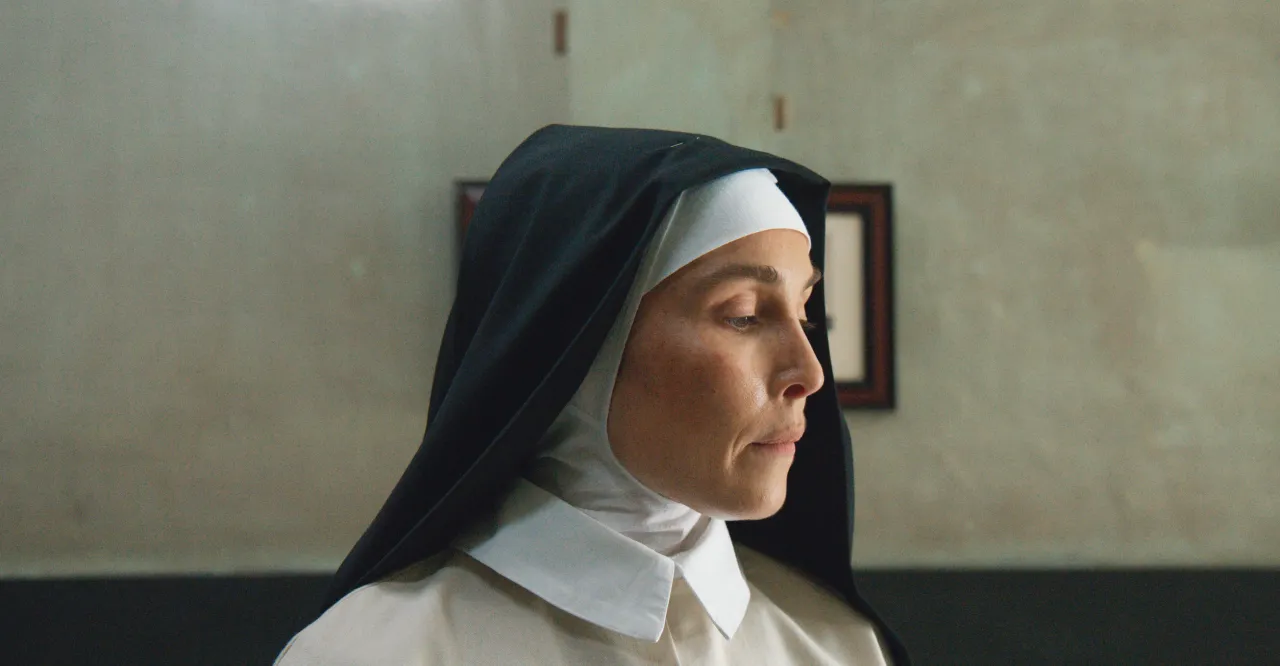Mother
Mother
VERDICT: Noomi Rapace and director Teona Strugar Mitevska give young Mother Teresa a lightly feminist “punk” remix, but sadly this non-committal bio-drama is not 'The Girl with the Jesus Tattoo'.
Dramatising a stormy week in the early life of Anjezë Gonxhe Bojaxhiu, later to earn worldwide fame and Catholic sainthood as Mother Teresa, Teona Strugar Mitevska’s third English-language has noble ambitions but fuzzy intentions. The Macedonia-born, Brussels-based writer-director makes a spirited stab at reclaiming the controversial religious charity campaigner as a wily protofeminist, quietly challenging the Vatican’s patriarchal power while secretly showing more mercy towards sinners than her dogmatic reputation would suggest. Noomi Rapace brings conviction and intensity to the starring role, even if she and Mitevska ultimately settle for the safer option of ambiguous homage over full-blown revisionist biopic.
Mother is opening the Orrizonti (Horizons) sidebar at Venice Film Festival this week, following in the footsteps or Mitevska’s The Happiest Man in the World (2022), a darkly comic drama about lingering wartime guilt in modern-day Bosnia, which was later submitted as Macedonia’s official Oscar contender. The director also previously tackled questions of religious faith and clerical sexism in her droll prize-winner God Exists, Her Name Is Petrunya (2019). Perhaps because it is constrained by a loose fidelity to true events and real people, this speculative sister act feels less playful and less sure-footed than both its predecessors.
All the same, Mother is elegantly shot and boasts two committed, compelling leads in Rapace and Dutch actress Sylvia Hoeks, who both spice up this minor-key chamber drama with nervy performances that crackle with repressed emotion and barely suppressed mania. In a curious twist, both stars previously played sisters in different iterations of Stieg Larsson’s Millennium franchise: Rapace was Lisbeth Salander in the original Swedish series based on The Girl with the Dragon Tattoo, while Hoeks played Salander’s vengeful sister Camilla in the glossy post-Larsson reboot The Girl in the Spider’s Web (2018).
Like Mitevska, Mother Teresa was born in Skopje, capital of North Macedonia. Long fascinated by this pioneering poverty activist, the director previously made a TV documentary series about her legacy, which partly served as the blueprint for this semi-fictional drama. Mother spans a single week in 1948 at the Loreto Entally convert in Calcutta (now Kolkata) where Teresa began her mission. Navigating a tense atmosphere of bitchy gossip and church politics, Teresa is anxiously awaiting permission from the Vatican to launch the Missionaries of Charity, the street-level religious order which would later spread from the slums of India to become an international organisation, securing her global fame, a Nobel Prize and ultimately sainthood.
With her departure imminent, Teresa is pushing for the church elders to anoint her chosen successor, the devout Polish nun Sister Agnieszka (Hoeks). But negotiations take a bumpy turn when Agnieszka confesses she is pregnant from a brief affair, and wracked with suicidal despair about how to proceed. Fierce religious opposition to sex and abortion turn this ethical dilemma into a crisis of faith for Agnieszka and a crisis of compassion for Teresa, whose damning initial response is pure egotism: “How could you do this to me?” The two women share a dark night of the soul, with Teresa struggling to balance human compromise and divine dogma, flexible private morality and stern clerical authority.
Mitevska and Rapace present Teresa as flawed but broadly sympathetic anti-heroine, steely in her self-belief, pushing against ingrained chauvinism for the greater good of doing God’s work. But the film-makers do not interrogate her all-consuming religious faith, nor her deeper psychological motives, with any kind of serious purpose. Perhaps because they have nothing substantial to add to her much-debated public image as the obsessively driven, rigidly devout, disciplinarian head of an admirable but problematic charity organisation. The end result is a film that promises bold new angles but ends up opaque and non-committal.
In fairness to Mitevska, Mother is not without artistry, commendable intentions or aesthetic pleasures. Virginie Saint Martin’s cinematography is full of austere beauty, consistently picking out painterly tableaux and recurring crucifix motifs in the shadowy interiors of the Kolkata convent scenes, which were actually shot in Belgium. Rapace has also talked the film up as “punk” re-telling of the Mother Theresa story. Sadly, this is not The Girl with the Jesus Tattoo, but there are some agreeably wild stylistic swerves, notably a horror-tinged hallucination in which the convert walls symbolically threaten to crush Agnieszka, and a delirious musical interlude where Teresa dances to “Hard Rock Hallelujah” by the Finnish heavy metal band Lordi, winners of the 2006 Eurovision Song Contest. These brief but thrillingly weird touches offer teasing hints of the bolder, braver, less reverential film Mother might have been.
Director: Teona Strugar Mitevska
Screenwriters: Goce Smilevski, Teona Strugar Mitevska, Elma Tataragi?
Cast: Noomi Rapace, Sylvia Hoeks, Nikola Ristanovski, Labina Mitevska
Cinematography: Virginie Saint Martin
Editor: Per K. Kirkegaard
Production designer: Vuk Mitevski
Costume designer: Claudine Tychon
Music: Magali Gruselle, Flemming Nordkrog
Producer: Labina Mitevska
Porduction companies: Entre Chien et Loup (Belgium), Sisters and Brother Mitevski (North Macedonia), Rainy Days Productions (Sweden), Frau Film (Denmark), SCCA/pro.ba (Bosnia), Raging Films (India)
Venue: Venice Film Festival (Orrizonti)
Sales: Kinology
In English
104 minutes

